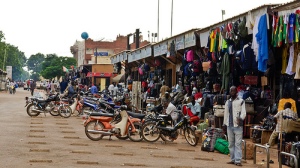A few bloggers talk about the Sudan elections:
- Roving Bandit points us to Pete Muller‘s work on Mary Boyoi’s candidacy for an assembly seat in Southern Sudan.
- Hoda Abdel-Hamid travels with South Sudanese President Salva Kiir on his re-election campaign.
- Reuters discusses the complexities of the SPLM’s boycott.
- Rob Crilly talks about the politics of the ICC ruling against President Omar al-Bashir.
- Hafiz Mohammed explores the logistical challenges the National Election Commission will face.
Elizabeth Dickinson is not impressed with a recent New Yorker piece on Guinea’s ex-leader Captain Moussa Dadis Camara:
Guinea’s troubles go far deeper, and are far more serious, than one man’s ludicrous antics explain. Dadis was probably a symptom of that more than anything — but we see him portrayed as the disease. I’m still waiting for a piece that explains the backstory behind what has happened in Guinea, because this is not it.
Inside Islam looks at Muslim-Christian relations in Senegal.
Assistant Secretary of State for African Affairs Johnnie Carson talks about the Binational Commission for the US and Nigeria:
With the launch of the Binational Commission, we expect the United States and Nigeria will engage in serious, high-level talks on issues of mutual interest. The Commission’s four working groups provide the structure of this engagement. We’ll first convene the Good Governance, Transparency, and Integrity Working Group, as electoral reform and improved administration are needed to help Nigeria achieve free, fair and peaceful elections in 2011. The group will also address corruption by seeking to build Nigeria’s institutional capacity and prosecutorial efforts. The Niger Delta and Regional Security Cooperation Working Group will support Nigeria’s efforts to provide immediate and tangible development and economic opportunity to the people of the Niger Delta. The Energy and Investment Working Group will work to improve transparency, administration, and performance of the power generation and hydrocarbon sectors. And finally, the Food Security and Agriculture Working Group will work to increase reliable access to food in Nigeria and the region through improvements in agriculture and trade policy.
Zambia’s Trade Minister gives an interview about China (h/t China in Africa).
Kal fills us in on politics, antiterrorism, and relations with Mali in Mauritania.
And last but not least, Texas in Africa looks at celebrity humanitarianism in Africa.
Feel free to use this as an open thread on Africa news and/or the Sudan elections.



